-
 +40 +1
+40 +1Autism could be diagnosed with stool sample, scientists say
Researchers found differences in the gut microbes of autistic people, raising hopes for faster diagnosis
-
 +26 +1
+26 +1Infections after surgery are more likely due to bacteria already on your skin than from microbes in the hospital − new research
Most infection prevention guidelines center on the hospital environment rather than the patient. But the source of antibiotic-resistant microbes is often from the patient’s own body.
-
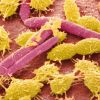 +21 +1
+21 +1'Obelisks': Entirely New Class of Life Has Been Found in The Human Digestive System
Peering into the jungle of microbes that live within us, researchers have stumbled across what seem to be an entire new class of virus-like objects.
-
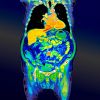 +41 +1
+41 +1A Mom Ate Chicken Burrito From A Suspicious Restaurant. This Is What Happened To Her Gut.
-
 +33 +1
+33 +1Your microbes live on after you die − a microbiologist explains how your necrobiome recycles your body to nourish new life
With the help of the microbes that once played an essential role in keeping you alive, the building blocks of your body go on to become a part of other living things.
-
 +34 +1
+34 +1A Strange World of Organisms Lives Inside You, But Not Like You Think
There are myths about the whole world inside your gut, made up of mostly harmless and often helpful microbes that reside in the gastrointestinal tract.
-
 +17 +1
+17 +1Volcanic microbe eats CO2 ‘astonishingly quickly’, say scientists
A microbe discovered in a volcanic hot spring gobbles up carbon dioxide “astonishingly quickly”, according to the scientists who found it. The researchers hope to utilise microbes that have naturally evolved to absorb CO2 as an efficient way of removing the greenhouse gas from the atmosphere. Ending the burning of fossil fuels is critical in ending the climate crisis, but most scientists agree CO2 will also need to be sucked from the air to limit future damage.
-
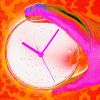 +14 +1
+14 +1'The post-antibiotic era': WHO warns of too few new drugs for deadly superbugs
Late last year, one of Dr. Vance Fowler’s patients — a man in his 60s who’d returned to North Carolina from visiting his family in Nepal — died of a bacterial infection. He’d been treated at a top U.S. hospital with access to the strongest antibiotics. But the infection, a drug-resistant strain of E. coli, surged on.
-
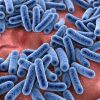 +28 +1
+28 +1Lower bacterial diversity is associated with irritable bowel syndrome
People with irritable bowel syndrome (IBS) have lower bacterial diversity in the intestine than do healthy people, according to a team of investigators. The investigators believe that theirs is the first analysis to find a clear association between IBS and reduced diversity in the microbiota of the gut.
-
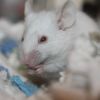 +19 +1
+19 +1Bacteria that break down nicotine found in the guts of mice
A team of researchers affiliated with multiple institutions in China, working with a colleague in the U.S., has isolated a type of bacteria in the guts of mice that break down nicotine. In their paper published in the journal Nature, the group describes how they isolated the bacteria and why their finding could reduce incidences of fatty liver disease in humans.
-
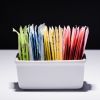 +10 +1
+10 +1Low-calories sweeteners might not be as good for us as we thought
Some artificial sweeteners disrupt the microbes in our gut—possibly in ways that increase the risk of weight gain, diabetes, and heart disease.
-
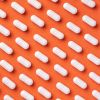 +19 +1
+19 +1Researchers create bacteria that could protect your gut from antibiotics
In 1928, Scottish microbiologist Alexander Fleming discovered what we know today as penicillin. Fleming’s work and that of his successors would go on to forever change how we treat bacterial infections. And to this day, antibiotics are one of the most powerful tools we have to protect people from a host of harmful bacteria.
-
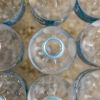 +24 +1
+24 +1Newly discovered enzyme helps reduce plastic waste to a simple molecule
Over the past five years or so we've seen some important breakthroughs demonstrating how enzymes can be used to break down common plastics, such as the PET used for everything from drink bottles to shampoo containers. In pursuit of a circular economy for plastic waste, scientists have now discovered a new enzyme that further breaks down one of the key plastic building blocks left behind by this process, leaving simple molecules that can be repurposed for use in new products.
-
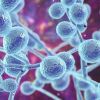 +15 +1
+15 +1A Toxic Fungus Could Be Contributing to Some People's Irritable Bowel Disease
Some strains of yeast in the human gut can produce toxins that could contribute to irritable bowel disease (IBD), according to new research.
-
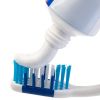 +21 +1
+21 +1Scientists Warn That Triclosan – Found in Toothpaste and Toys – Triggers Harm to the Gut
Previous research has shown triclosan’s toxicity, but the new study provides a closer look at the changes caused in the gut’s microscopic population. Researchers connected specific gut microbial enzymes, notably gut microbial beta-glucuronidase (GUS) proteins, with triclosan and showed these enzymes drive triclosan to wreak havoc in the gut.
-
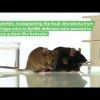 +20 +1
+20 +1Study reveals link between autism and gut microbiome in mice
-
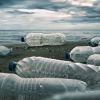 +20 +1
+20 +1Microbes across the land and ocean are evolving to degrade plastic
Five years ago, scientists digging through soil and sludge around a plastics recycling center in Japan discovered a bacterium that was feeding on the popular packaging material PET as an energy source, with help from a pair of purposely evolved enzymes. A fascinating discovery at the time, a new study has shown this to be part of a much wider trend in which such plastic-degrading enzymes are increasing in numbers and diversity in response to plastic pollution around the world.
-
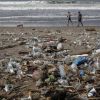 +4 +1
+4 +1Bugs across globe are evolving to eat plastic, study finds
Microbes in oceans and soils across the globe are evolving to eat plastic, according to a study. The research scanned more than 200m genes found in DNA samples taken from the environment and found 30,000 different enzymes that could degrade 10 different types of plastic.
-
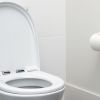 +15 +1
+15 +1Here's why you should always close the toilet lid when you flush
The average person flushes the toilet five times a day and, apparently, most of us are doing it wrong. Get ready for some hard truths about why you should always leave the lid closed when you flush. When you pull the lever, in addition to taking whatever business you’ve left behind down into the sewer pipes, your toilet also releases something called “toilet plume” into the air — which is basically a spray filled with microscopic bacteria, including E. coli.
-
 +4 +1
+4 +1Glaciers Are Disappearing and So Too Might the Microbial Ecosystems Within
It was a hard hike up to the glacier. Pico Humboldt is the second-highest mountain peak in Venezuela and it'd taken three days for Andrés Yarzábal and his colleagues to make it to the top. They'd faced bad weather, strong winds and rocky terrain, but now the goal was close at hand. In front of them lay La Corona, also sometimes called Humboldt Glacier, one of the last two glaciers in the entire country.
Submit a link
Start a discussion




















